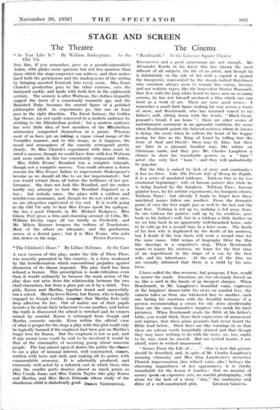The Cinema
"Rembrandt." At the Leicester Square Theatre REVERENCE and a good cameraman are not enough. Mr. Alexander Korda in his latest film has chosen the most difficult of all subjects, the life of an artist, and though he is indubitably on the side of Art with a capital A against the bourgeoisie, represented by the steeple-hatted Dutchmen who somehow always seem to remain film extras, literary and not realistic types, like the benevolent Doctor ManaiSeiv, that Jew with the long white beard we have seen on so many screens, he has not himself produced a film which one can treat as a work of art. There are some good scenes : I remember a small dark figure making his way across a waste of snow, and Rembrandt, who has returned ruined to his father's mill, sitting down with the words, " Black bread, peasant's bread, I am home " ; there are other scenes of melodramatic sentiment in an agreeable tradition, the scene when Rembrandt paints the beloved mistress whom he knows is dying, the scene when he softeris the heart of the beggar posing for him as the King of Israel by telling him the story of Saul and David : these may be false, but they are false in a pleasant familiar way, like robins on Christmas cards, and they give Mr. Charles Laughton a chance to show his remarkable powers as a " ham " actor—the very best " ham "—and they will undoubtedly be popular.
But the film is ruined by lack of story and continuity : it has no drive. Like The Private Life of Henry the Eighth, it is a series of unrelated tableaux. Tableau One (a far too emotional beginning) : wife of famous painter dies while he is being feasted by the burghers. Tableau Two : famous painter loses, by his artistic experiments, his bourgeois clients. Tableau Three : but already I begin to forget how these unrelated scenes follow one another. From the dramatic point of view the first might just as well be the last and the last first. Nothing is led up to, nothing is led away from. In one tableau the painter, sold up by his creditors, goes back to his father's mill, but in a tableau a little further on we see him back in an apparently well-furnished home, only to be sold up for a second time in a later scene. The death of his first wife is duplicated by the death of his mistress, but I doubt if the tear ducts will work a second time for the same cause. Odd scraps of biography litter the filth like shavings in a carpenter's shop. When Rembrandt wants to marry his mistress, we learn for the first time of an impediment in the shape of a son by the first wife, and his inheritance. At the end of the film we are casually informed that there is a child by his mis- tress.
I have called the film reverent, but pompous, I fear, would be nearer the mark. Emotions are too obviously forced on us, like a card in the hands of an inexpert sharper. When Rembrandt; in Mr: Laughton's beautiful voice, expreSies at the burghers' dinner-table his views on marital love, the camera takes us from one whiskered face to another, each one baring his emotions with the dreadful intimacy of a peeress recommending' a cream for oily skins (incidentally these are the same insensitive burghers who mock his later pictures). When Rembrandt reads the Bible at his father's table, you would think, from their expressions of amazement and rapture, that these pious peasants had never heard the Bible read before. Their faces are like warnings. to us that these are solemn words beautifully uttered and that though they may have nothing to do with the story, we, too, ought to be, nay, must be, moved. But our cynical hearts, I am afraid, react in wicked amusement.
" Scenes From the Life of . . . "—that is how this picture should be described, and, in spite of Mr. Charles Laughton's amazing virtuosity and Miss Elsa Lanehester's attractive Flemish impersonation (her refined voice, alas 1 betrays the charming ungainliness of her appearance), it is chiefly remarkable for the lesson it teaches : that no amount of money spent. on expensive sets, no careful photography, will atone for the lack of a story " line," the continuity araj
drive 'of a well.constructed plot. GRAHAM GREENE.




























































 Previous page
Previous page